- Home
- Robert Goddard
The Corners of the Globe
The Corners of the Globe Read online
ABOUT THE BOOK
Spring, 1919. James ‘Max’ Maxted, former Great War flying ace, returns to the trail of murder and treachery he set out on in The Ways of the World.
He left Paris after avenging the murder of his father, Sir Henry Maxted, convinced that the only man who knows about the mysterious events leading up to Sir Henry’s death is elusive German spymaster, Fritz Lemmer.
To find out more, he enlists in Lemmer’s network under false colours and is despatched to the Orkney Isles, where the German High Seas Fleet has been interned in Scapa Flow. His mission: to recover a document secreted aboard one of the German battleships. But the information it contains is so explosive that Max is forced to break cover and embark on a desperate and dangerous race south, pursued by men happy to kill him to recover the document.
The breathless chase will take Max from the far north of Scotland to London and on to Paris, where the world’s governments are still bartering over the spoils in the aftermath of the Great War. The stakes could not be higher. It is life and death for all concerned.
Contents
Cover
About the Book
Title Page
Chapter 1
Chapter 2
Chapter 3
Chapter 4
Chapter 5
Chapter 6
Chapter 7
Chapter 8
Chapter 9
Chapter 10
Chapter 11
Chapter 12
Chapter 13
Chapter 14
Chapter 15
Chapter 16
Chapter 17
Chapter 18
Chapter 19
Chapter 20
Chapter 21
Chapter 22
Chapter 23
Chapter 24
Chapter 25
Chapter 26
Chapter 27
Chapter 28
Chapter 29
Chapter 30
Chapter 31
Chapter 32
Chapter 33
Chapter 34
Chapter 35
Chapter 36
Chapter 37
Chapter 38
Chapter 39
Chapter 40
Chapter 41
Chapter 42
Chapter 43
Chapter 44
Chapter 45
Chapter 46
Chapter 47
Chapter 48
Chapter 49
Chapter 50
Chapter 51
Chapter 52
Chapter 53
Chapter 54
Chapter 55
Chapter 56
Chapter 57
Chapter 58
Chapter 59
Chapter 60
Chapter 61
Chapter 62
Chapter 63
Chapter 64
Chapter 65
Chapter 66
Chapter 67
Author’s Note
About the Author
Also by Robert Goddard
Copyright
THE CORNERS
OF THE GLOBE
Robert Goddard
MAX COULD ONLY wish he had made the crossing from Scotland in such weather: calm, cool and benign, the sea sparkling, the sky blue, with puffs of cloud herded at the horizon like well-behaved sheep. He stepped out of the Ayre Hotel into the peace of early morning, lit a cigarette and gazed around him.
The few locals already up and about would probably have identified him as a visitor even if they had not seen him leave the hotel. Tall, lean and youthfully handsome, dressed in clothes that were just a little too well cut to have been bought from an Orcadian tailor, Max looked what he was: a man out of his element. Yet he also looked relaxed and self-assured: a man as unlikely to attract suspicion as he was condescension.
He turned towards the harbour and started walking. The staff of the Ayre had warned him that Kirkwall Bay did not normally appear as it did now: an anchorage for dozens of US minesweepers and support vessels, most of them stationary at this hour, but some with smoke drifting up from their funnels. They were there to clear the thousands of mines laid around the Orkneys during the war, a task expected to take them many months.
Max knew little of the sea war, sharing the general prejudices of those who had engaged the enemy on the Western Front that the Royal Navy had had a cushy time of it, Jutland notwithstanding. His gale-tossed passage across the Pentland Firth had forced him to reconsider, however. He did not envy anyone who had spent the past four and more years in these waters.
Of all the places in the world where he had never expected to find himself, the Orkneys were high on the list. But he was aware that there were currently a good many people there who wished themselves elsewhere, doubtless including the crews of all those American minesweepers he could see strung out across the bay.
The same was certain to apply to the crews of the interned German High Seas Fleet, under Royal Naval guard in Scapa Flow. Until glancing at an atlas shortly before his journey north, Max had supposed Kirkwall overlooked the Flow and he would therefore have a good view from the city of the captive ships. But Kirkwall was on the northern side of Mainland, the Orkneys’ principal island, albeit at its narrowest part. To the south, enclosed by Hoy, South Ronaldsay and various other smaller islands, lay the vast natural roadstead of Scapa Flow, where seventy-four German warships were corralled at anchor.
Max would see them soon enough, of course. He knew that. They were why he had travelled to Orkney. And they were why he was out so early.
But early or not, he was not proof against unlooked-for encounters. As he passed the Girnel, the old grainstore facing the west pier, he saw a woman he recognized approaching along the harbour front. It was too late to think of avoiding her. She smiled and raised a hand. He smiled too and waved back.
Susan Henty was clearly no local herself, a tall, big-boned young woman with a horsey look about her, dressed in newish tweeds. She had auburn hair and a broad, open smile. Max imagined her as an enthusiastic rider to hounds in the Leicestershire countryside she had already told him she hailed from. She was impossible to dislike, which was half the problem in itself. He could not afford to appear secretive. But neither could he afford to reveal much about himself, least of all the truth.
‘An early riser too, I see, Max,’ she said as they met.
‘I thought I’d take the morning air.’
‘Me too. I walked down to the cathedral. Rather a fine structure, actually.’
‘Selwyn not up yet, then?’
‘Probably still in bed, poring over a map. He’s very excited about seeing the Ring of Brodgar. As you are, I trust.’
‘Well, I . . .’
‘Selwyn’s so pleased you agreed to help him.’ Most women looked up at Max. Susan Henty engaged him levelly eye to eye. She lowered her voice confidentially. ‘I’m not sure he believes I’m completely reliable when it comes to surveying.’
‘I’m not sure I’m completely reliable.’
‘Perhaps not, but you’re a man, which makes all the difference.’ She smiled. ‘This trip’s doing Selwyn no end of good, Max. I’m more grateful than I can say for your willingness to indulge him. How’s your driving, by the way?’
‘My driving?’
‘Yes. You know.’ She mimed turning a steering wheel.
‘Ah, that. Not too hot, I’m afraid. A better pilot than a driver, to be honest.’
‘Then I’ll do it. One of the few blessings of the war is that it enabled women to take up things like driving without anyone disapproving. And I’m rather good behind the wheel, if I say so myself.’
‘I’m sure you are.’
She affected
a frown. ‘Do I detect a note of sarcasm?’
‘Not at all.’
‘Mmm. I’ll have to be on my guard with you. I can see that. Now, the hotel’s recommended a garage where we can hire a car. And it looks like a fine day for it. So, shall we leave around ten?’
‘Suits me.’
‘Good. See you later, then.’
Max tipped his hat and watched Susan Henty stride on her way, back towards the Ayre. He disliked misleading her. He disliked every aspect of the subterfuge he was obliged to practise. It was a damnable game to have to play.
He lit another cigarette and waited until Susan was out of sight. Then he walked smartly along the street fronting onto the harbour, past the Kirkwall Hotel – of altogether grander appearance than the Ayre – and out along the east pier.
It was considerably longer than the west pier, with an extension added onto the seaward curve where it enclosed the harbour. Max strolled past a warehouse and assorted stacks of cargo and on towards the far end, passing another building that sported a prominently stencilled sign: US NAVAL PERSONNEL ONLY. An American marine of considerable bulk was standing by the door. He stifled a yawn as he returned Max’s ‘Good morning’.
A US Navy cutter was moored on one side of the pier. Max headed for the other side, propped his foot on a bollard and tossed the butt of his cigarette into the sea as he gazed idly out towards the massed minesweepers. He glanced at his watch and checked the time. Yes. He was neither late nor early. All he had to do was wait.
And not for long.
‘GOOD MORNING.’
The man was bulky and bearded, but had a sprightly look about him that owed more than a little to his mischievously twinkling eyes. He was dark-haired, thirtyish, dressed in a US Navy lieutenant’s uniform. He was wearing a greatcoat, despite the mildness of the morning, and smoking a cigarette. His accent was indeterminately American. West coast or east or where in between was hard to gauge.
‘Good morning,’ Max said cautiously.
‘I’d take you for an educated man.’
‘That’s gratifying.’
‘And you’re English, right?’
‘Yes. I am.’
‘Maybe you can settle an argument for me. Your prime minister before Lloyd George was Asquith?’
‘He was.’
‘And before him . . . Balfour?’
‘No. Campbell-Bannerman.’
‘Ah. I lose the argument, then . . . Max.’
Max nodded in acknowledgement that the preliminaries had been satisfactorily concluded. ‘Fontana?’
‘Lieutenant Grant Fontana, United States Navy. At your service.’
‘What’s your role here?’
‘Liaison with the local merchant marine. Which is handy for you, considering I know a drifter skipper who likes to make a little money on the black market – including illicit bartering visits to the German ships in Scapa Flow.’
Max paused before responding. ‘That does sound handy. Can he be trusted?’
‘He can be trusted to do what he has to do to stay out of trouble. And I can land him in a whole load of trouble any time I like, as he well knows. But on the subject of trust . . .’
‘Yes?’
‘Who was that woman you were talking to?’
‘Susan Henty. I met her and her brother on the ferry.’
‘You met them?’ Fontana suddenly seemed less friendly. ‘You should have made it your business to meet no one.’
‘They’re harmless.’
‘So you say. What do they think you’re doing here?’
‘My brother was killed in the Vanguard disaster.’
‘Remind me what disaster that was.’
‘HMS Vanguard blew up while anchored in Scapa Flow on the night of the ninth of July 1917, with the loss of more than seven hundred souls. Probably caused by the spontaneous combustion of cordite in the magazine, though there were rumours of sabotage.’
‘And one of those seven hundred was your “brother”?’
‘Sub-Lieutenant David Hutton.’
‘So, that makes you Max Hutton?’
‘As far as the Hentys and everyone here’s concerned, yes. I’ve come to see where it happened – to pay my respects.’
‘Touching. Truly touching.’ Fontana sucked a last drag out of his cigarette and flicked it away. ‘Listen, I don’t want to know what you’re after on that German ship. I’ve done what the boss wanted me to do here: make it possible for you to get on board. It’s not going to be easy, but Tom Wylie’s the man to do it. I’ll see him this evening and explain to him what’s wanted and brief you on the plan straight after. OK?’
‘OK.’
‘Meet me in the back bar of the Albert at nine o’clock. Mounthoolie Lane. It’s Saturday, so it’ll be busy. And noisy. No one will pay us any attention.’
‘I’ll be there.’
‘Any questions?’
‘Which ship will Wylie take me to?’
Fontana gave a mirthless little laugh. ‘You’ll find out when the time comes and not before. I mean to stick to the rules even if you don’t. The boss doesn’t like deviations.’
‘But he isn’t here, is he, to worry about how we get the job done?’
‘Not here? Well, that depends on exactly what you mean by “here”. I often feel he’s looking over my shoulder watching what I do.’
‘Do you feel that now?’
Fontana lit another cigarette and contemplated Max as he drew on it. ‘You should feel that now. It’d be good for you. Stop you taking too many chances. This is your first big job for him, isn’t it? If you want to live to do another, you need to be more careful. Guard your tongue and watch your back. That’s my advice. I’ll see you later.’
Fontana did not wait for a response. He turned and strode away across the pier towards the moored cutter. Max watched him from the corner of his eye as he started down a flight of steps to reach the craft.
The cutter got under way and headed out across the bay towards the minesweepers. Then Max began a slow, measured amble back along the pier.
THE FERRY FROM Aberdeen to Kirkwall had taken the weather as it found it: foul but no fouler than was often the case, according to a member of the crew who seemed to think Max was in need of reassurance, callow Londoner straight off the sleeper from King’s Cross that he obviously was. Fresh air was the only cure for seasickness Max knew, so he sat out the voyage on deck, with occasional descents to the saloon to warm himself by the stove.
He was striding back and forth by the rail, muffled up and clapping his arms together, when the ferry docked at Wick to pick up more passengers. That was when he caught his first sight of the Hentys. There was something in their attitude to each other, as well as a slight facial similarity, that told him they were brother and sister rather than husband and wife. And the sister’s anxiety about her brother was also apparent, even as they hurried along the pontoon to board. She watched his every step with a worried frown, as if he might fall or stumble – or simply collapse.
The Hentys also shunned the saloon and fell into conversation with Max as the only other passenger who preferred the open deck. Selwyn Henty, big-boned like his sister, but with thinning hair and an altogether less robust appearance, confessed at once that claustrophobia rather than seasickness was the problem in his case. ‘I did some tunnelling in the war. Since then I don’t seem to be able to tolerate sharing confined spaces with other people.’
The war had left other marks on Selwyn Henty: a gaze that never fixed itself on anything for longer than a few seconds and a tremor of the hands that the motion of the ship disguised until it came to lighting a cigarette or taking a nip from his hip-flask. He spoke with nervous rapidity as well, often jumbling his words.
Jumbled or not, however, his eloquence on the subject of ancient megaliths was undeniable. He was seeking to put the finishing touches to a theory he had devised – ‘a mathematical solution’, he termed it – concerning the prehistoric stone monuments of Britain. Thos
e of northern Scotland were particularly illuminating, apparently. He and his sister had followed a fortnight in the Outer Hebrides – ‘The Callanish circles must be seen to be appreciated, Mr Hutton’ – with a tour of the stone rows of Caithness – ‘Fascinating, quite fascinating’ – and were now heading for the Ring of Brodgar on Orkney. ‘You’ve heard of it, of course?’
Max had not. Nor did he gain any inkling of the nature of Selwyn’s ‘mathematical solution’ from rapid-fire references to azimuths, extinction angles and the rate of decline of the obliquity of the ecliptic. Susan Henty gave him a few sympathetic grimaces during her brother’s disquisition, to which she added an apologetic explanation when Selwyn descended to the heads.
‘Selwyn’s never told me much about his wartime experiences, Mr Hutton, but they’ve taken their toll on him, as you can see. He wasn’t always so intense. This research project is good for him, though. If he can see it through and publish his findings, I think he’ll have been able to put some healing distance between himself and all the things that happened to him in France. Of course, he’s lucky to be alive when so many of his comrades aren’t, but his survival has come at a price.’
‘At least he has you to help him through it,’ said Max.
‘I do what I can. And you? Is there anyone to help you through it?’
‘Oh, the RFC was a breeze compared with the Army.’
‘I don’t believe that for a moment.’
‘It was, I assure you. I’m ridiculously unscathed.’
The broad, confident smile Max gave Susan Henty then was much the same as the one he gave both her and Selwyn as they set out in the hired Humber from Kirkwall the following morning. He was a free agent until he met Fontana again that evening. There seemed no reason not to enjoy himself as best he could.
Susan, however, proposed that they take an indirect route to Brodgar along the southern coastal road, so they could have a view of Scapa Flow and the interned German fleet. Since this would also give them a view of the waters in which HMS Vanguard had been blown up in 1917, claiming the life of Sub-Lieutenant David Hutton among hundreds of others, Max was in no position to object.
He prepared himself to appear moved by a first sight of the place where his supposed brother had died and was dismayed, when the time came, by how shamelessly he performed the role.

 The Fine Art of Invisible Detection
The Fine Art of Invisible Detection One False Move
One False Move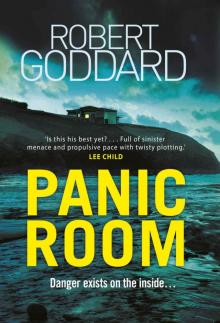 Panic Room
Panic Room Beyond Recall
Beyond Recall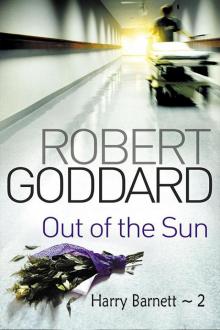 Out of the Sun
Out of the Sun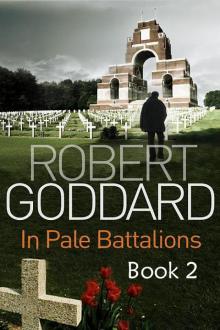 In Pale Battalions - Retail
In Pale Battalions - Retail Painting The Darkness - Retail
Painting The Darkness - Retail The Corners of the Globe
The Corners of the Globe Name To a Face
Name To a Face Closed Circle
Closed Circle Caught In the Light
Caught In the Light Into the Blue
Into the Blue Past Caring - Retail
Past Caring - Retail Past Caring
Past Caring Hand In Glove - Retail
Hand In Glove - Retail Borrowed Time
Borrowed Time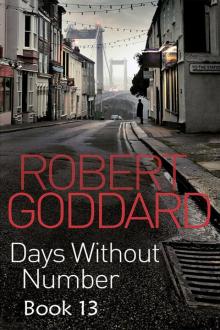 Days Without Number
Days Without Number James Maxted 03 The Ends of the Earth
James Maxted 03 The Ends of the Earth Fault Line - Retail
Fault Line - Retail Play to the End
Play to the End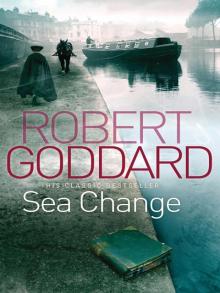 Sea Change
Sea Change Never Go Back
Never Go Back Take No Farewell - Retail
Take No Farewell - Retail Blood Count
Blood Count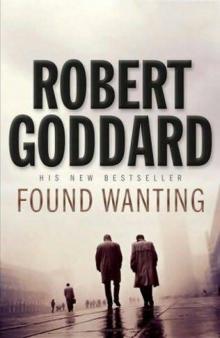 Found Wanting
Found Wanting Sight Unseen
Sight Unseen Hand in Glove
Hand in Glove The Ways of the World
The Ways of the World